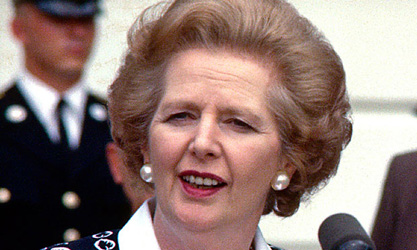Some of the august contributors to this website have made the parallel between Mr Arsene Wenger, Manager of the Arsenal Football Club, and Mr Brian Clough, who on any basis, went on too long as manager of Nottingham Forest and took them back to the second tier of English Football.
I like to offer an alternative view. I seek to show parallels between our (possibly) soon to be retiring manager and Margaret Hilda Thatcher.
Those parallels are of course spooky, and it’s not just that, like the blessed Margaret, Arsene lives somewhere near Finchley or likes to wear a lot of blue.
Both leaders evoke a passionate loyalty in their acolytes. There are many for whom their leader could and can do no wrong. Any present transgression was and is forgiven with a wave of the hand and a misty eyed look back at past triumphs.
Triumphs of the Iron Will.
We can look at Margaret Thatcher’s removal of free school milk from small children (put there by a postwar Labour government to guard against malnutrition) and equate it with Arsene Wenger’s removal of pie and chips and 20 pints a night from the Arsenal players’ diet. That would be wrong. Where the school milk decision was one of reckless abandon of good principles out of a lack of understanding or care, good dietary practices amongst our players revolutionised the English game. We may rightly feel that the sentiment “give up the booze Tony or get lost” was the manager’s finest hour. (Ed’s note – OK, TA renounced alcohol just before AW arrived, but the principle stands. Players consuming large amounts of alcohol would not have survived.)
No, the outstanding similarity between the Iron Lady and the Alsatian Polyglot/ Polymath is that of an unbending belief in the rightness of their own position during the decline and terminal phase of their leadership.
When a career in politics or football starts, the application of strong and correct principles with an iron will to succeed often proves a very successful combination. But it must be accompanied with good judgment, and an ability to understand and appreciate changing circumstances. Crucially, a really good leader must be able, even if only in 1% of their mind, to consider the possibility that they may be wrong. It is all too easy to leave oneself open to the illusion that because one has been right and successful in the past, that correctness and success are to be with you, always, world without end.
And then of course there are the casualties – those who die or are injured to save the leader’s face. Mrs Thatcher has her Falklands victims. Mr Wenger has those whose careers have been ended arguably for want of a deterrent midfield enforcer on station to protect them or who were played hopelessly out of position ad infinitum to the point where they gave up or left.
Of course I am being unfair. Whereas Margaret Thatcher effected essential reforms but also strongly arguably suborned and harmed our society forever, Arsene Wenger has revolutionised English football and harmed our club only for a few years after he is removed. Upon the basis that the punishment fits the crime, I wish him, by contrast, a long and happy retirement. Soon.







